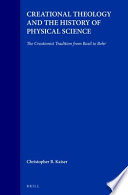 | Colin Brown, Steve Wilkens, Alan G. Padgett - 1990 - 456 pages
...to move the bodies within His boundless sensorium, and thereby to form and reform parts of the part of the Universe, than we are by our will to move the parts of our own bodies. And yet we ought not to consider the world as the body of God, or the several parts thereof as the parts... | |
 | A. Rupert Hall - 2002 - 324 pages
...English version of the passage discussed is in Newton (1952: 403): the wondrous effects of Creation 'can be the effect of nothing else than the Wisdom...our Will to move the Parts of our own Bodies. And yet we are not to consider the World as the Body of God, or the several Parts thereof, as the Parts... | |
 | Immanuel Kant - 2001 - 546 pages
...Contrivance of those very artificial Parts of Animals . . . and the Instinct of Brutes and Insects, can be the effect of nothing else than the Wisdom...are by our Will to move the Parts of our own Bodies" (Newton, Opticks (London: 1931), p. 403). Newton's conception of space as a manifestation of God reflects... | |
 | Beatrice Bruteau, Bede Griffiths - 1996 - 422 pages
...to himself."14 God not only perceives all things, but can act through them. According to Newton, God "being in all places, is more able by his will to...than we are by our will to move the parts of our own bodies."15 For Newtonian physics, Absolute space was the container of all things and the medium through... | |
 | Christopher B. Kaiser - 1997 - 480 pages
...Places, is more able by his Will to move the Bodies within his boundless uniform Sensorium [space], and thereby to form and reform the Parts of the Universe,...are by our Will to move the Parts of our own Bodies. The problem of the dissipation of motion in Newton's cosmology was due to the underlying dualism of... | |
 | Daniel Garber, Michael Ayers - 1998 - 992 pages
...perceives them, and comprehends them?'215 The aetiological point of this is revealed in Query 31, where God 'is more able by his Will to move the Bodies within...than we are by our Will to move the Parts of our own Bodies'.216 Similarly, in the second edition of the Principia (Cambridge, 1713), Newton writes that... | |
 | Benno Werlen - 1999 - 262 pages
...formuliert dies wie folgt: »(...) (T)he Instinct of Bruts and Insects, can be the effect of nothing eise, than the Wisdom and Skill of a powerful ever-living...than we are by our Will to move the Parts of our own Bodies».27 Hier wird also die bisher angedeutete Beziehung zwischen Gott und dem absoluten Raume präzisiert.... | |
 | Roberto Torretti - 1999 - 532 pages
...by their immediate presence to himself" (Opticks, p. 370). This "powerful, ever-living Agent [. . .] being in all Places, is more able by his Will to move...are by our Will to move the Parts of our own Bodies" (Opticks, p. 403). I cannot say that I understand these theological pronouncements. I mention them... | |
 | Gottfried Wilhelm Freiherr von Leibniz, Samuel Clarke - 2000 - 132 pages
...form and reform the parts of the universe, than our spirit which is in us the image of God is able by our will to move the parts of our own bodies. < And yet we are not to consider the world as the body of God, or the several parts of it as the parts of... | |
 | Roger Ariew, Eric Watkins - 2000 - 326 pages
...form and reform the parts of the universe, than our spirit, which is in us the image of God, is able by our will to move the parts of our own bodies. <And yet we are not to consider the world as the body of God, or the several parts of it as the parts of... | |
| |